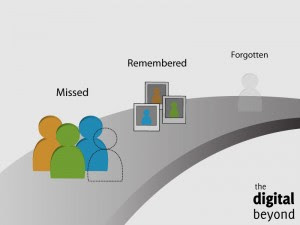Birth is an easy go-to metaphor for anything creative or requiring hard work. "This [car, story, painting, Web site, etc.] is my baby," implying that person has been laboring over her or his project for some amount of time.
That's interesting when you contrast the birth of Cyber You, in the form of a profile or Web site, with a panel topic from the 2010 SXSW conference called Post Mortem: Digital Death and Legacy. I was listening to the local NPR station when I heard a report about it. Read the description and try telling me this isn't intriguing:
If you passed away today, how would your online friends find out? Should logins and passwords be in your will? Has technology changed mourning? Will your digital media stay online forever? Our lives are lived and documented online, it’s time to talk about the implications of death and digital legacy.
What a thought, huh? I've wondered that about Facebook profiles of victims we report on in the news.
Let's pretend nobody knew your Facebook password, you didn't have it written down somewhere and it was entirely distinct from all your other passwords. Let's also pretend - for the purposes of this conversation - you somehow die. (It can be quick & painless)...
- Is it irreverent and discourteous to keep your profile up?
- What is Facebook's role in this? Who would authorize it to deactivate your profile?
- What would it take, legally, for a family member to obtain that private information from Facebook? How much might that cost (on top of funeral/burial costs)?
- Would friends at first use your profile as a mourning site to post memories? (See this Newsweek article, "R.I.P. on Facebook") What would it later become, years after your death?
It's like Cyber You lives on while Physical You is gone.
This prompts two thoughts:
1) It's probably a good idea to keep a record of your passwords somewhere -- even if it's in a safe vault at your bank.
2) Perhaps this is the new way of wills. Alongside to whom you will your car might be the name of the person entrusted with carrying out your Digital Wishes, whether deactivation, deletion or - who knows - Digital Immortality*.

Here's a Web site that has gone so far as to discuss Stages of the Digital Afterlife. It mentions what I talked about earlier: death... remembered... forgotten.
(Here's a great, short little explainer video)
(Here's a great, short little explainer video)
Regarding the Forgotten stage, the site says this:
"As far as I’m aware, there are no services addressing this stage. This is where the real potential exists in this industry. Imagine being able to examine the online content of your ancestors and know who they were and what they thought. I’m not sure how this will work, but we’re here to talk about it."
Sound like it's a conversation pushing itself to the forefront of the cultural conversation.
* For kicks, I Googled "Digital Immortality" and stumbled across this creepy Web site. Despite its "old-school" appearance, it does address questions about the ethics of Digital Immortality (copyright, for example).
Thanks for mentioning our site. Without question, raising awareness and understanding about this issue is our goal.
ReplyDeleteThe particular SXSW panel idea you mention didn't make it into the conference, but several others (including ours) did. Ours is actually happening at 5:00 today: http://my.sxsw.com/e/416
I'm glad that you stumbled upon my session submission for this year's SXSW. As Evan remarked, my session was not selected this year. However, Evan and John from The Digital Beyond did a great job, as did Corvida Raven in her session on Digital Wills (http://my.sxsw.com/events/event/810). I'm happy that my session inspired you to think about this very important issue of digital legacy.
ReplyDelete